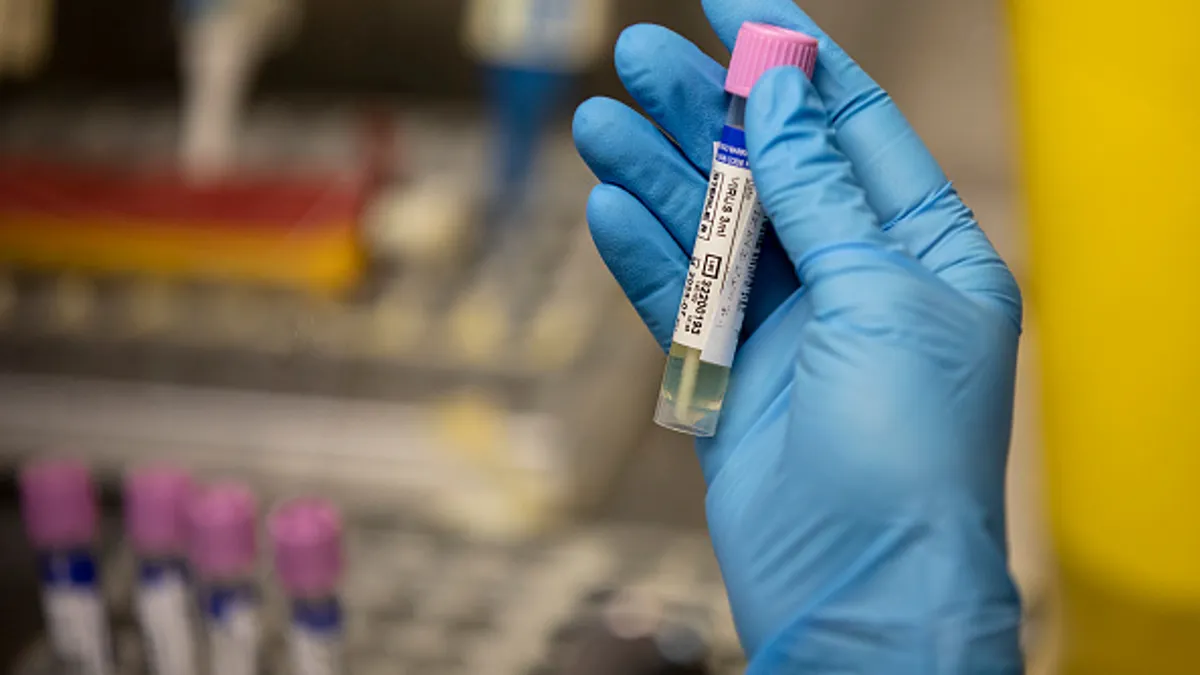Dive Brief:
- Five major U.S. commercial medical laboratories say they have the capacity to join a federal government effort to rapidly increase the number of tests nationwide for monkeypox, an industry trade group says.
- Mayo Clinic Laboratories, one of the five, is working to obtain equipment to expand monkeypox testing capacity and plans to offer tests for monkeypox starting in early July. The firm is currently working to validate the CDC’s test in the next two weeks.
- Currently, tests are only available through 78 public health labs across the U.S. They can process about 10,000 tests per week. The commercial laboratories are expected to ramp up capacity to 60,000 tests per week.
Dive Insight:
Reference laboratories are rushing to prepare equipment and complete studies amid uncertainty over how quickly the number of monkeypox cases will increase in the U.S. As of Wednesday, the U.S. had a total of 351 reported cases, according to the Centers for Disease Control and Prevention, though experts have said this is likely undercounted, and worldwide, recorded cases have reached 5,115 the CDC reports.
While it’s not clear what test demand will look like in the coming months, laboratories are preparing for an increase.
”Reference labs that are working with the CDC are preparing for high test demand by completing studies to validate automated DNA extraction instruments, which will dramatically increase testing capacity,” said Matthew Binnicker, director of clinical virology at the Mayo Clinic Laboratories in Rochester, Minnesota.
Mayo is one of five commercial laboratories that the Centers for Disease Control and Prevention is sending its tests to as part of a broader effort to expand testing capacity as cases increase in the U.S. The other labs are Labcorp, Quest Diagnostics, Aegis Sciences and Sonic Healthcare.
“The five commercial laboratories have extensive networks with clinicians across the country and will be able to transport to their laboratories for testing patient samples collected in physician offices, clinics, hospital emergency department and other health care settings, nationwide,” the American Clinical Laboratory Association, an industry trade group, wrote in an email.
World Health Organization Director-General Tedros Adhanom Ghebreyesus said this week that he is concerned current monkeypox outbreaks could spread to children and pregnant women.” I am concerned about sustained transmission because it would suggest that the virus is establishing itself and it could move into high-risk groups including children, the immunocompromised and pregnant women,” Ghebreyesus added: “We are starting to see this with several children already infected.”
The commercial labs are expected to ramp up capacity in coming weeks, said Tim Stenzel, the Food and Drug Administration’s director of in-vitro diagnostics and radiological health during an online meeting Wednesday to discuss testing with industry professionals and other stakeholders.
Paying for the tests, and reimbursement rates for private laboratories has not yet been settled, said Binnicker.
“There are ongoing discussions on how testing will be funded and capacity increased, and government agencies have indicated they are ready to remove barriers to achieve the goal of increased testing capacity,” Binnicker wrote in an email.
Meanwhile, the Department of Health and Human Services said Tuesday that it plans to distribute 1.6 million doses of monkeypox vaccine over several months, with 296,000 doses of the Jynneos vaccine available during July. Fifty-six thousand will be allocated immediately.
The vaccines will be distributed equitably to states based on population, and at-risk communities will be targeted in the vaccination campaign, HHS said in a statement.
"This includes those who had close physical contact with someone diagnosed with monkeypox, those who know their sexual partner was diagnosed with monkeypox, and men who have sex with men who have recently had multiple sex partners in a venue where there was known to be monkeypox or in an area where monkeypox is spreading," the statement said.
HHS has also said that hospitals can develop their own tests. Stenzel said those would fall under the FDA’s enforcement discretion for laboratory-developed tests, meaning they wouldn’t need to be cleared by the agency.
During the meeting, stakeholders asked whether they could make a rapid antigen test similar to point-of-care tests for COVID-19, and asked whether they should seek regulatory authorization for new monkeypox tests.
Stenzel said it’s not clear how a point-of-care antigen test would perform on the lesions that usually accompany monkeypox infection, because “vigorous swabbing” is needed to get a good result.
As for seeking regulatory clearance, Stenzel said test developers can use the agency’s less-rigorous 510(k) pathway since the CDC test is already cleared, but with relatively few cases at the moment to validate tests, “it’s a challenging path for test developers to pursue right now.”
Currently, tests for the virus are limited to state and local public health laboratories, said Beth Thielen, an assistant professor of pediatrics at the University of Minnesota Medical School’s division of pediatric infectious diseases. For example, if a case is suspected in Minnesota, doctors call a 24/7 number at the state health department to talk about risk factors and send in samples for testing.
Unlike with the COVID-19 pandemic, tests for monkeypox were already developed by the CDC and cleared by the FDA years ago.
The test is a two-step process. It’s designed to detect orthopoxvirus, the genus of viruses that includes monkeypox, smallpox and cowpox. From there, specimens can be sent to the CDC to confirm the virus is monkeypox.
The latest outbreak started in early May, with a cluster of cases in the U.K. As of June 22, Europe still had the largest number of cases, according to the World Health Organization and cases had been detected in 50 countries. On June 25, the WHO determined that the outbreak was not yet a public health emergency.













